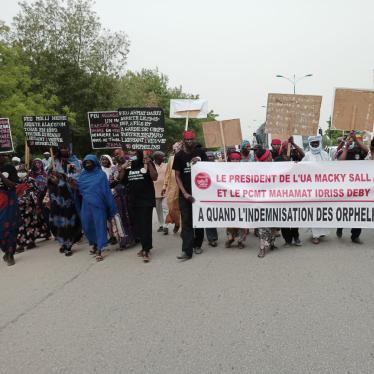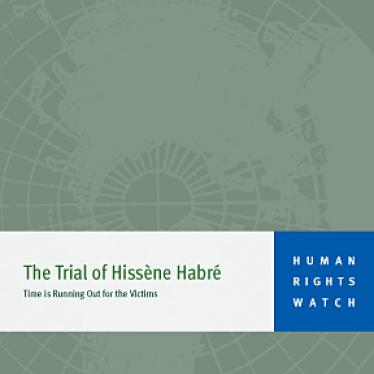(The Hague) – The International Court of Justice (ICJ) should order Senegal to extradite the former Chadian dictator Hissène Habré to Belgium, Human Rights Watch and Chadian victims groups said today.
Hearings on Belgium’s application for an order requesting Senegal to move forward with Habré’s prosecution or extradition are scheduled to begin at the court on March 12, 2012.
“The Senegalese government has made it quite clear that it will not prosecute Habré,” said Souleymane Guengueng, who nearly died during almost three years of mistreatment in Habré’s prisons before founding an association of victims to seek justice. “The International Court of Justice should order Senegal to send Habré to Belgium so we can finally have our day in court before all the survivors pass away.”
Habré, 69, who has been living in Senegal for 21 years, is wanted by Belgium on charges of crimes against humanity, war crimes, and torture committed during his rule, from 1982 to 1990. Belgium recently filed its fourth request seeking Habré’s extradition after Senegal rebuffed the first three, part of what Nobel Peace Prize winner Bishop Desmond Tutu has described as an interminable political and legal soap opera for the victims.
Under the UN Convention against Torture and Other Cruel, Inhuman or Degrading Treatment or Punishment, Senegal must either prosecute or extradite Habré. In papers filed with the International Court of Justice, Senegal contends that it still intends to prosecute Habré. Senegalese officials, however, including President Abdoulaye Wade, have on numerous occasions publicly ruled out putting Habré on trial.
During 2011, Senegal’s foreign minister, Madické Niang, said time and again that Habré would not be tried in Senegal. In July, Wade announced that he was expelling Habré to Chad – where he has already been condemned to death in absentia for unrelated crimes – only to retract that decision in face of an international outcry. In announcing the retraction, Senegal’s foreign minister again ruled out holding Habré’s trial in Senegal.
The government of Chad also announced in July that it was in favor of extraditing Habré to Belgium. In 2002, the Chadian government waived Habré’s immunity so he could be prosecuted in Belgium.
Habré was first indicted in Senegal in 2000, but after political interference by the Senegalese government, Senegalese courts held that they had no jurisdiction to prosecute Habré for extraterritorial crimes. They said Senegal had not incorporated provisions of the Torture Convention requiring states to establish their jurisdiction over acts of torture committed abroad when the alleged perpetrator is in their territory. The decision and the surrounding political interference were denounced by UN rapporteurs on torture and judicial independence.
Other victims of Habré, including several Belgian citizens, then filed a case against Habré in Belgium. After four years of investigation, a Belgian judge in September 2005 requested Habré’s extradition. A Senegalese court ruled that it lacked jurisdiction to decide on the extradition request, however.
Senegal then asked the African Union “to indicate the jurisdiction which is competent to try this matter.” When the African Union called on Senegal to prosecute Habré “on behalf of Africa,” Wade accepted. The next four years were taken up with wrangling over the trial budget and framework.
As negotiations dragged on, and after Wade threatened to let Habréleave Senegal, Belgium filed suit against Senegal at the ICJ in February 2009. In May 2009, in response to a request from Belgium for the indication of provisional measures, Senegal formally pledged not to allow Habré to leave Senegal pending the ICJ’s final judgment.
In November 2010, the Court of Justice of the Economic Community of West African States (ECOWAS) held that Habré’s trial should be carried out by “a special ad hoc procedure of an international character.” Later that month, nations coming together at a Donors Round-Table fully funded the projected trial budget while the African Union responded to the ECOWAS court decision by proposing a special court within the Senegalese justice system with some judges appointed by the African Union. In May 2011, however, Senegal withdrew from negotiations with the African Union over creation of the court.
Since then, a Senegalese appeals court has refused to rule on two more Belgian extradition requests because it concluded that the legal papers were not in order. In both cases, the Senegalese government apparently did not transmit the Belgian legal papers intact to the court.
“The Senegalese government has given the victims the run-around for 21 years, and is now trying to pull the wool over the ICJ’s eyes,” said Jacqueline Moudeïna, lawyer for the victims and president of the Chadian Association for the Promotion of Human Rights. “The ICJ should call a halt to Senegal’s shenanigans.”
The ICJ, which sits in The Hague, is the United Nations’ highest court. The court deals generally with cases between UN member states and it has no jurisdiction to prosecute individuals. Its rulings can be legally binding on states.
Belgium’s application charges that Senegal has violated the Torture Convention and its obligations under customary international law by failing to prosecute or extradite Habré.
In May 2006, the United Nations Committee against Torture found that Senegal had violated the Torture Convention and called on Senegal to prosecute or extradite Habré. In July 2011, Navi Pillay, the UN high commissioner for human rights, reminded the Senegalese government that “[i]t is a violation of international law to shelter a person who has committed torture or other crimes against humanity, without prosecuting or extraditing him.” In November 2011, the Committee against Torture’s rapporteur again reminded Senegal of its obligations.
In July 2011, the Chadian government complained that “[w]hile some victims have died and others wait for over two decades for justice, Hissène Habré, accused of extremely serious crimes, continues to enjoy his comfortable exile in Dakar, Senegal.”
The public hearings at the ICJ will extend until March 21. A ruling is not expected for a few months.
Habré ruled Chad from 1982 until he was deposed in 1990 by President Idriss Déby Itno and fled to Senegal. His one-party regime was marked by widespread atrocities, including waves of ethnic campaigns and systematic torture. Files of Habré’s political police, the Direction de la Documentation et de la Sécurité (DDS), which were discovered by Human Rights Watch in 2001, reveal the names of 1,208 people who were killed or died in detention and 12,321 victims of different human rights violations.







